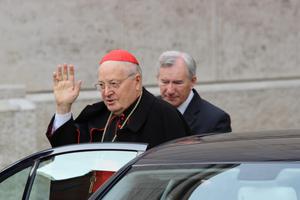Pope Tabs Colombian Bishop to Oversee Lay Catholic Society Amid Ongoing Crisis
Colombian Bishop Noel Londoño Buitrago has been appointed papal commissioner for the Sodalitium Christianae Vitae, while it deals with revelations that its founder was a serial abuser.

VATICAN CITY — The Vatican announced Wednesday that Colombian Bishop Noel Londoño Buitrago has been appointed papal commissioner for the Sodalitium Christianae Vitae, a Catholic society of apostolic life.
Bishop Londoño, of the Diocese of Jericó, will oversee the community as it continues a process of reform, following revelations that its founder, Luis Fernando Figari, committed serial acts of abuse while leading the community. Several former leaders of the community have also faced related allegations.
Bishop Londoño’s appointment was announced in a Jan. 10 communique from the Vatican, which stated that he would carry out his role alongside Cardinal Joseph Tobin of Newark, New Jersey, who has served as papal delegate overseeing the SCV’s reform process since May 2016.
Cardinal Tobin will continue to be the group’s liaison with the Vatican’s Congregation for Institutes of Consecrated Life and Societies of Apostolic Life, and will focus primarily on reforming economic matters. In his role as Commissioner, Bishop Londoño will oversee the leadership of order as it continues to reform their governing policies and formation procedures.
In a statement released Jan. 10, the Sodalitium expressed gratitude to Pope Francis and Vatican officials “for following the life of our community with concern.”
“We reiterate our willingness to accept all that is available for the development of our Society. We reaffirm once again our absolute obedience to the Holy Father and Holy Mother Church,” the Sodalitium’s statement read.
The Sodalitium Christianae Vitae was established by Figari in 1971 in Peru, and was granted pontifical recognition in 1997. Alejandro Bermúdez, executive director of CNA, is a member of the community.
In addition to founding the SCV, a community of men, Figari also founded the Marian Community of Reconciliation and the Servants of the Plan of God, a community of women and an order of women religious. In 2002, he was named a consultor to the Pontifical Council for the Laity, and served in subsequent consultative roles at the Vatican.
Figari stepped down as superior general of the Sodalitium Christianae Vitae in 2010, after allegations of abuse surfaced in Peru. The current superior general is Alessandro Moroni Llabres.
The community was investigated after the publication of a book in 2015 by journalists Paola Ugaz and Pedro Salinas, chronicling years of alleged sexual, physical and psychological abuse by members of the SCV. In addition to Peru, the community operates in Argentina, Brazil, Colombia, Costa Rica, Chile, Ecuador, the United States and Italy.
Figari and other former leaders of the community remain the subject of criminal investigations in Peru.
In May 2016, Pope Francis named then-Archbishop Tobin as the pontifical delegate charged with overseeing the community’s handling of the investigation and their process of reform.
In February 2017, a team of independent investigators commissioned by the Sodalitium reported that “Figari sexually assaulted at least one child, manipulated, sexually abused, or harmed several other young people; and physically or psychologically abused dozens of others.”
As a result, the Vatican’s Congregation for Institutes of Consecrated Life issued a decree the same month forbidding Figari from any contact with the religious community, and banning him from returning to Peru without permission from the current superior of the Sodalitium. Figari was also forbidden to make any public statements.
The Vatican made a similar move in the case of the Legionaries of Christ after it was discovered that its founder, Father Marcial Maciel, had been living a double life.
In 2006, with the approval of Pope Benedict XVI, the Congregation of the Doctrine of the Faith imposed upon Father Maciel “a retired life of prayer and penance, renouncing any form of public ministry.” Due to his advanced age, Father Maciel was not the subject of a formal canonical trial.
From that point on, Benedict XVI carried out a process of reform for the Legionaries, and in 2010 named then-Archbishop Velasio de Paolis as papal delegate to serve in a role similar to what Bishop Londoño will have for the SVC.
After his appointment, Cardinal De Paolis formed a commission charged with drafting new constitutions for the Legionaries. He completed his mandate in 2014 when the new constitutions were approved by Pope Francis. The cardinal died in September 2017.
No specific time frame was given for Bishop Londoño’s mandate as commissioner and it is not yet known what steps he will take, however, he is likely to follow the model set by Cardinal De Paolis, and step aside when the community has a clear path forward.
- Keywords:
- cardinal thomas tobin
- father marcial maciel
- legionaries of christ
- pope benedict
- pope francis
- sodalitium christianae vita
- sodality
















